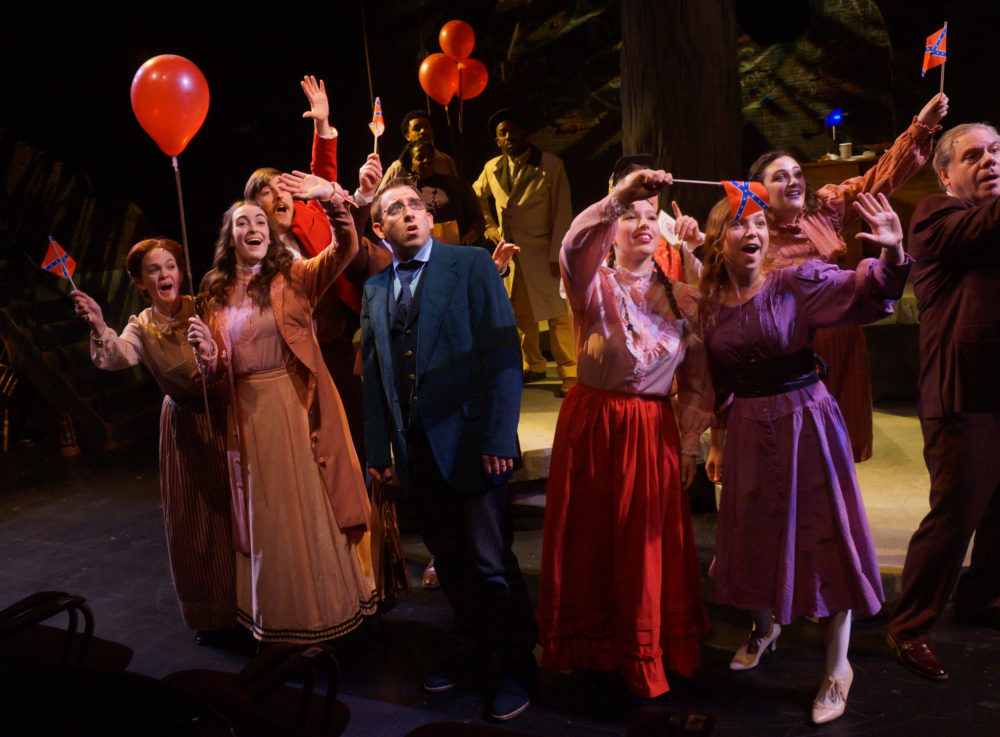 Presented by Moonbox Productions
Presented by Moonbox Productions
Music and Lyrics by Jason Robert Brown
Book by Alfred Uhry
Directed by Jason Modica
Music direction by Catherine Stornetta
Choreography by Kira Troilo
Costume Design by Chelsea Kerl
Set Design by Lindsay Genevieve Fuori
Lighting Design by Steve Shack
Performance dates: Dec 15 – Dec 28, 2019
Calderwood Pavilion at the BCA, Roberts Theatre, 527 Tremont St., Boston:
Facebook link
Review by Chloé Cunha
(Boston, MA) “Where will you stand when the flood comes?” An angry mob asks the ominous question, and Parade gives little comfort in its answer. Moonbox Production’s staging offers an apocalyptic vision of the past and present, with little optimism for the future. It’s a dizzying tale well-told, but the bleakness it offers may be tough to swallow in the present day when hope feels increasingly scarce.
Parade follows the real-life tragedy of Leo Frank (Phil Tayler), a Jewish man wrongfully accused of the murder of a young girl, Mary Phagan (Anna Bortnick) in Atlanta in 1913. Hungry for a conviction and convinced of Leo’s guilt, prosecutor Jack Dorsey (Jerry Bisantz) twists what little evidence there is into a damning case. Meanwhile, sensationalist journalists like Britt Craig (Dan Prior) whip the public up into an anti-semitic frenzy, and Leo’s wife Lucille (Hayley K. Clay) makes a valiant effort to advocate for his innocence and freedom.
The first half of the show is riveting, a waking nightmare fascinating to watch. The story kicks off on “Confederate Memorial Day,” marking the end of the Civil War. What begins as a normal day for him grows sinister as one of his employees, Mary, is found dead, and he quickly becomes the prime suspect. Strikingly, rather than have her disappear, Mary is made to stay as a silent witness to the action unfolding after her death. She and Leo interact often in a way that suggests he may as well already be a ghost, too.
As his situation worsens the jazzy score becomes discordant and heavy, chaotic drum beats and atonal riffs underscoring the surrealism of his experience. In the background, red warning lights affixed to the wall pulse like a beating heart. At every turn, Leo, alone in blue, seems swallowed in red: red lights, red dresses and suits, scarves and hats on the parade-goers around him, the red hills of Georgia lurking in some unseen distance, rhapsodized by a jubilant crowd in song. Red confederate flags wave in the hands of happy revelers.

The cast of the Moonbox Productions’ staging of “Parade.” (Courtesy Sharman Altshuler)
The plot is most effective in these moments of heightened reality, culminating in the trial scene that caps the end of the first act. The gavel slams down, verdict done, and the members of the court transform into malevolent caricatures. The world seems to slow and distort around Leo, as the faces around him twist into ugly grimaces, even his lawyer (Andrew Child) shrugging in mocking exaggeration. No matter what happens afterwards, it’s obvious in this moment his fate is sealed.
Performances were quite good all around, with some excellent singing, dancing, and staging. Special mention to Aaron Patterson who shined as Jim Conley, a fellow factory worker of Leo’s who throws him under the bus in a deal with Dorsey. Patterson belted out his solos with powerful charisma and stole the show whenever he was on stage. Prior, similarly, was a compelling villain as Mr. Craig, a malevolent jester who might be amusing had he any sense of morality, and was also excellent as Governor Slaton. Finally Tayler was a sympathetic hero, and showed some range when portraying a sleazy fever-dream version of Leo during the trial.
In the second act the nightmare starts to normalize, and the expressionistic flourishes of the first act give way to a more melodramatic bend instead. Lucille fights to save Leo and we are told “never to underestimate her,” that “this is not over yet.” Her optimism is at odds with the hellish situation they’re in, and indeed all her efforts feel hollow when, after winning a major victory, the play soon reaches its violent conclusion.
On that note, sensitive audience goers may appreciate some forewarning here. Spoiler ahead… If you’re expecting a carefully timed blackout, you may be shocked to see that instead Leo is pummeled and physically dragged by the noose off stage. The result is intensely graphic, even almost voyeuristic, and I’m not sure what effect they were trying to achieve– the audience is a complicit bystander, perhaps?
Overall, Parade was a well-crafted, enthralling production. Still, if it was meant to be a rallying cry for justice, I for one felt mostly despair. As I write this review, another synagogue was vandalized in a hate crime in Los Angeles. And if you Google Lucille Frank, on the first page you get a link to a National Vanguard article (a white nationalist propaganda website). Parade only briefly addresses anti-black racism, but it’s worth noting that “Confederate Memorial Day” is still observed in Georgia, though now referred to as “State Holiday.” The change came only in 2015, after the white supremacist church attack in Charleston, SC.
In case anyone needed a reminder of where things are today, in the end, the happy parade-goers re-emerge clad in modern clothes, singing the melody that bookends the musical, a soaring anthem on the beauty of Georgia. The final image is of Leo and Lucille, happy together one last time. But the final words belong to the crowd: “For the patriarchs/ Who gave everything for Georgia/ And the old red hills of home!”
